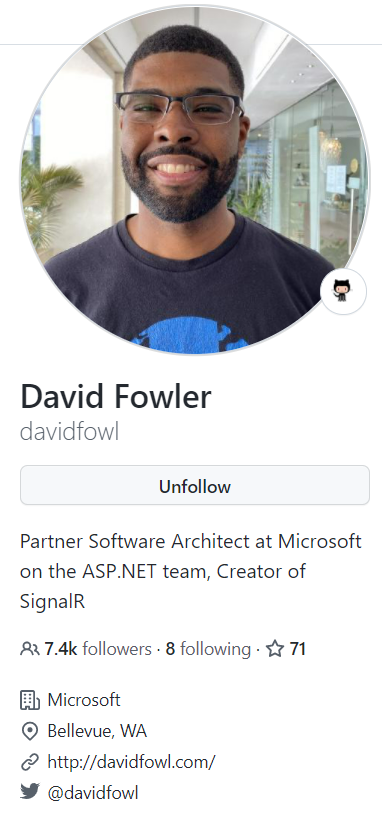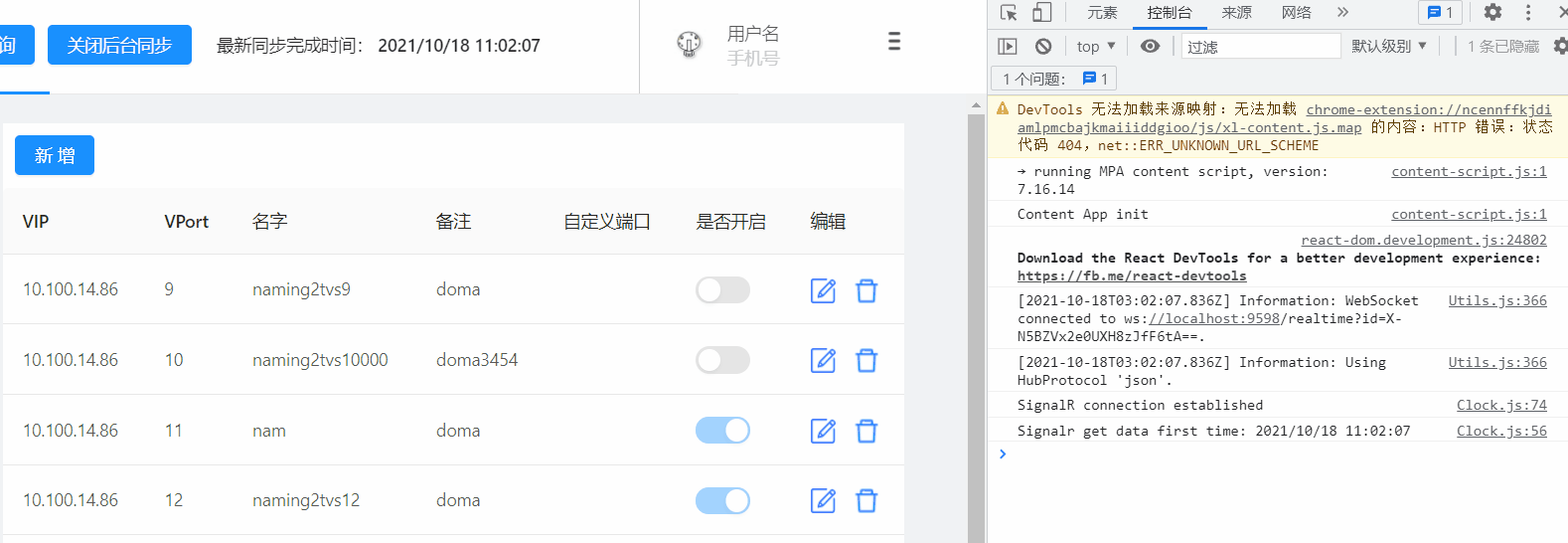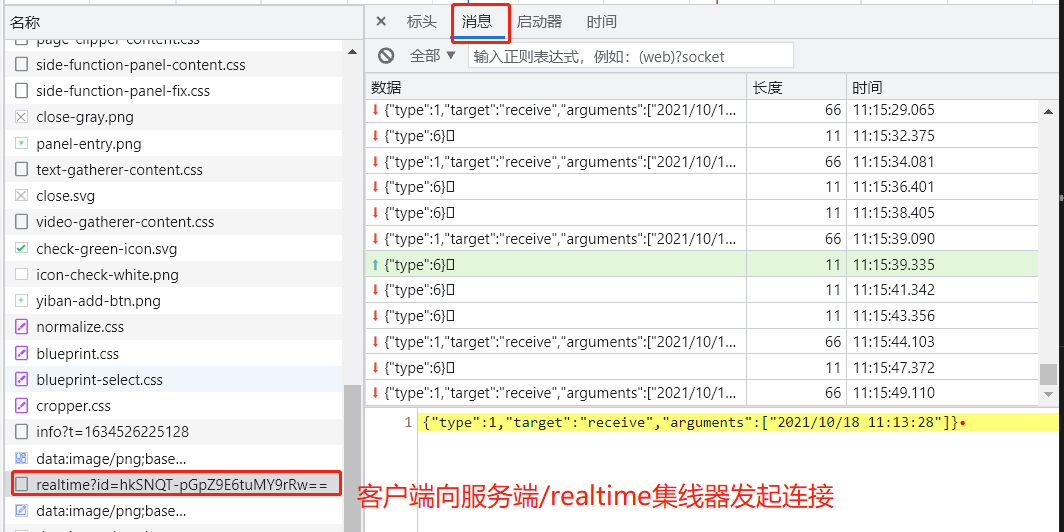哼哧哼哧半年,优化改进了一个运维开发web平台。
本文记录SignalR在react/golang 技术栈的生产小实践。
1. 背景
有个前后端分离的运维开发web平台, 后端会间隔5分钟同步一次数据,现在需要将最新一次同步的时间推送到web前端。
说到[web服务端推送],立马想到SignalR,(我头脑中一直有技术体系, 但一直没实践过。)
signalr是微软推出的实时通信标准框架,内部封装了 websocket、服务端发送事件、长轮询, 可以算是实时通信的大杀器,传送门。
实际编码就是react写signalr客户端,golang写signalr服务端,盲猜有对应的轮子。
2. 撸起袖子干
果然, signalr的作者David Fowler实现了node、go版本, 这位老哥是.NET技术栈如雷贯耳的大牛:

但是他的仓库很久不更了,某德国大佬在此基础上开了新github仓库继续支持。
signalr的基本交互原理:
(1) signalR提供了一组API, 用于创建从服务端到客户端的远程过程调用(RPC),这个调用的具体体现是 : 从服务端.NET 代码调用位于客户端的javascript 代码。
(2) signalr提供了 管理实例、连接、失连, 分组管控的API。

这里面最关键的一个概念是集线器Hub,其实也就是RPC领域常说的客户端代理。
服务端在baseUrl上建立signalr的监听地址;
客户端连接并注册receive事件;
服务端在适当时候通过hubServer向HubClients发送数据。
go服务端
(1) 添加golang pgk:
go get github.com/philippseith/signalr
(2) 定义客户端集线器hub,这里要实现HubInterface接口的几个方法, 你还可以为集线器添加一些自定义方法。
package services
import (
"github.com/philippseith/signalr"
log "github.com/sirupsen/logrus"
"time"
)
type AppHub struct{
signalr.Hub
}
func (h *AppHub) OnConnected(connectionID string) {
// fmt.Printf("%s connected
", connectionID)
log.Infoln(connectionID," connected
" )
}
func (h *AppHub) OnDisconnected(connectionID string) {
log.Infoln(connectionID," disconnected
")
}
// 客户端调用的函数, 本例不用
func (h *AppHub) Send(message string) {
h.Clients().All().Send("receive", time.Now().Format("2006/01/02 15:04:05") )
}
(3) 初始化客户端集线器, 并在特定地址监听signalr请求。
这个库将signalr监听服务抽象为独立的hubServer
shub := services.AppHub{}
sHubSrv,err:= signalr.NewServer(context.TODO(),
signalr.UseHub(&shub), // 这是单例hub
signalr.KeepAliveInterval(2*time.Second),
signalr.Logger(kitlog.NewLogfmtLogger(os.Stderr), true))
sHubSrv.MapHTTP(mux, "/realtime")
(4) 利用sHubServer在任意业务代码位置向web客户端推送数据。
if clis:= s.sHubServer.HubClients(); clis!= nil {
c:= clis.All()
if c!= nil {
c.Send("receive",ts.Format("2006/01/02 15:04:05"))
}
}
注意: 上面的receive方法是后面react客户端需要监听的JavaScript事件名。
react客户端
前端菜鸡,跟着官方示例琢磨了好几天。
(1) 添加@microsoft/signalr 包
(2) 在组件挂载事件componentDidMount初始化signalr连接
实际也就是向服务端baseUrl建立HubConnection,注册receive事件,等待服务端推送。
import React from 'react';
import {
JsonHubProtocol,
HubConnectionState,
HubConnectionBuilder,
HttpTransportType,
LogLevel,
} from '@microsoft/signalr';
class Clock extends React.Component {
constructor(props) {
super(props);
this.state = {
message:'',
hubConnection: null,
};
}
componentDidMount() {
const connection = new HubConnectionBuilder()
.withUrl(process.env.REACT_APP_APIBASEURL+"realtime", {
})
.withAutomaticReconnect()
.withHubProtocol(new JsonHubProtocol())
.configureLogging(LogLevel.Information)
.build();
// Note: to keep the connection open the serverTimeout should be
// larger than the KeepAlive value that is set on the server
// keepAliveIntervalInMilliseconds default is 15000 and we are using default
// serverTimeoutInMilliseconds default is 30000 and we are using 60000 set below
connection.serverTimeoutInMilliseconds = 60000;
// re-establish the connection if connection dropped
connection.onclose(error => {
console.assert(connection.state === HubConnectionState.Disconnected);
console.log('Connection closed due to error. Try refreshing this page to restart the connection', error);
});
connection.onreconnecting(error => {
console.assert(connection.state === HubConnectionState.Reconnecting);
console.log('Connection lost due to error. Reconnecting.', error);
});
connection.onreconnected(connectionId => {
console.assert(connection.state === HubConnectionState.Connected);
console.log('Connection reestablished. Connected with connectionId', connectionId);
});
this.setState({ hubConnection: connection})
this.startSignalRConnection(connection).then(()=> {
if(connection.state === HubConnectionState.Connected) {
connection.invoke('RequestSyncTime').then(val => {
console.log("Signalr get data first time:",val);
this.setState({ message:val })
})
}
}) ;
connection.on('receive', res => {
console.log("SignalR get hot res:", res)
this.setState({
message:res
});
});
}
startSignalRConnection = async connection => {
try {
await connection.start();
console.assert(connection.state === HubConnectionState.Connected);
console.log('SignalR connection established');
} catch (err) {
console.assert(connection.state === HubConnectionState.Disconnected);
console.error('SignalR Connection Error: ', err);
setTimeout(() => this.startSignalRConnection(connection), 5000);
}
};
render() {
return (
<div style={{ '300px',float:'left',marginLeft:'10px'}} >
<h4>最新同步完成时间: {this.state.message} </h4>
</div>
);
}
}
export default Clock;
(3) 将改react组件插入到web前端页面
效果分析
最后的效果如图:

效果分析:
(1) web客户端与服务器协商
传输方式http://localhost:9598/realtime/negotiate?negotiateVersion=1,
返回可用的传输方式和连接标识ConnectionId。
{
"connectionId": "hkSNQT-pGpZ9E6tuMY9rRw==",
"availableTransports": [{
"transport": "WebSockets",
"transferFormats": ["Text", "Binary"]
}, {
"transport": "ServerSentEvents",
"transferFormats": ["Text"]
}]
}
(2) web客户端利用上面的ConnectionId向特定的服务器地址/realtime连接,建立传输通道,默认优先websocket。

